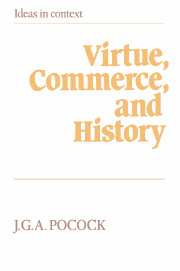 Virtue, Commerce, and History
Virtue, Commerce, and History Book contents
- Frontmatter
- Contents
- 1 Introduction: The state of the art
- PART I
- PART II
- 5 Modes of political and historical time in early eighteenth-century England
- 6 The mobility of property and the rise of eighteenth-century sociology
- 7 Hume and the American Revolution: The dying thoughts of a North Briton
- 8 Gibbon's Decline and Fall and the world view of the Late Enlightenment
- 9 Josiah Tucker on Burke, Locke, and Price: A study in the varieties of eighteenth-century conservatism
- 10 The political economy of Burke's analysis of the French Revolution
- PART III
- Index
6 - The mobility of property and the rise of eighteenth-century sociology
Published online by Cambridge University Press: 05 May 2010
- Frontmatter
- Contents
- 1 Introduction: The state of the art
- PART I
- PART II
- 5 Modes of political and historical time in early eighteenth-century England
- 6 The mobility of property and the rise of eighteenth-century sociology
- 7 Hume and the American Revolution: The dying thoughts of a North Briton
- 8 Gibbon's Decline and Fall and the world view of the Late Enlightenment
- 9 Josiah Tucker on Burke, Locke, and Price: A study in the varieties of eighteenth-century conservatism
- 10 The political economy of Burke's analysis of the French Revolution
- PART III
- Index
Summary
Property appears in the Western tradition of political discussion under a number of heads, which might be summarised as follows: First and foremost, there is the tradition begun by Aristotle and continued by Aquinas, in which property appears as a moral and political phenomenon, a prerequisite to the leading of a “good life,” which is essentially civic. In the form of the Greek oikos, a household productive unit inhabited by women, minors and slaves, it provided the individual with power, leisure and independence, and the opportunity to lead a life in which he (not until Mary Wollstonecraft do we encounter a thinker systematically interested in adding “she” to this context) could become what he ought to be. Property was both an extension and a prerequisite of personality (and we should be aware of the possibility that different modes of property may be seen as generating or encouraging different modes of personality). The citizen possessed property in order to be autonomous and autonomy was necessary for him to develop virtue or goodness as an actor within the political, social and natural realm or order. He did not possess it in order to engage in trade, exchange or profit; indeed, these activities were hardly compatible with the activity of citizenship. Greek politics were not based on bourgeois concepts, which seems odd when you consider that “politics” and “bourgeois” have the same root meaning of “living in a city.”
- Type
- Chapter
- Information
- Virtue, Commerce, and HistoryEssays on Political Thought and History, Chiefly in the Eighteenth Century, pp. 103 - 124Publisher: Cambridge University PressPrint publication year: 1985
- 21
- Cited by
